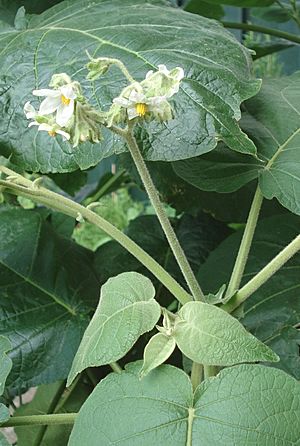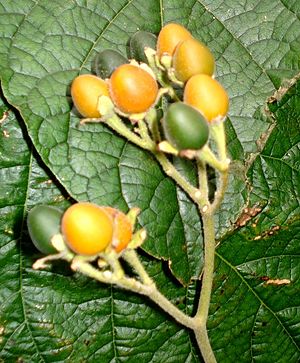Dwarf tamarillo facts for kids
Solanum abutiloides is a type of plant that belongs to the nightshade family, called Solanaceae. This plant grows naturally only in Argentina and Bolivia. You can find it growing like a weed in rocky areas, near rivers, and in scrubland. It grows at high places, from about 900 to 3,600 meters above sea level.
People sometimes call it the dwarf tamarillo. This is because it looks a bit like another plant called the tamarillo. Both plants grow very fast from seeds. They also have leaves that smell very strong and nice. Solanum abutiloides was once known by an older name, Cyphomandra sibundoyensis.
Quick facts for kids Dwarf tamarillo |
|
|---|---|
 |
|
| Blossoms and leaves | |
 |
|
| Ripe fruits | |
| Scientific classification | |
| Genus: |
Solanum
|
| Species: |
abutiloides
|
Contents
About the Dwarf Tamarillo
This plant grows quickly into a shrub or a small tree. It can reach up to 9 meters (about 30 feet) tall. However, it is usually much smaller than that.
Flowers
Small flowers grow on the branches all over the plant. Each group of flowers can have as many as 60 blooms.
Fruits
After the flowers, small, oval-shaped fruits grow. These berries turn a yellow-orange color when they are ripe. They are about 1 centimeter (a little less than half an inch) wide or slightly larger. When the berries are not ripe, they can be a bit harmful to eat. But once they are fully ripe, they are safe to eat.
Uses of the Plant
The fruits of Solanum abutiloides are edible. However, this plant is not grown very often by farmers. Because of this, the fruits have not been specially grown to taste good.
Flavor and Decoration
The flavor of the fruit can be surprising or not very pleasant. So, Solanum abutiloides is usually grown as a plant just for its beauty. The groups of ripe fruits look very pretty and decorative.
Common Pests
Like many plants in the nightshade family, this plant can attract certain small insects. These include aphids, spider mites, and whiteflies.
See also
 In Spanish: Solanum abutiloides para niños
In Spanish: Solanum abutiloides para niños
 | Charles R. Drew |
 | Benjamin Banneker |
 | Jane C. Wright |
 | Roger Arliner Young |

